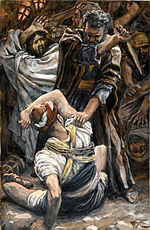
Wiki Details

In the Hebrew Bible, Jethro was Moses's father-in-law, a Kenite shepherd and priest of Midian, sometimes called Reuel (or Raguel). In Exodus, Moses' father-in-law is initially referred to as "Reuel" (Exodus 2:18) but afterwards as "Jethro" (Exodus 3:1). He was also identified as the father of Hobab in Numbers 10:29, though Judges 4:11 identifies him as Hobab.
Druze identify Jethro with the prophet Shuayb, also said to come from Midian. For the Druze, Shuayb is considered the most important prophet, and the ancestor of all Druze.
General info from Wikipedia.org

